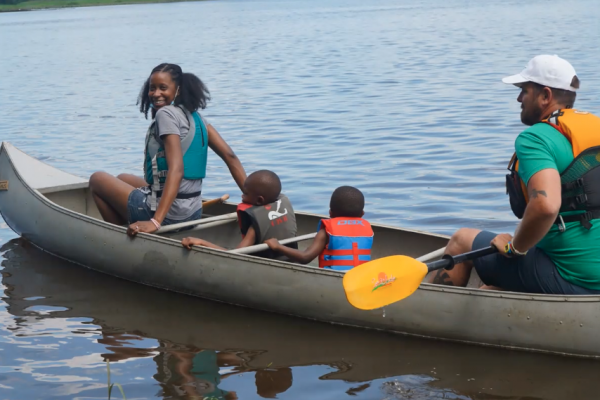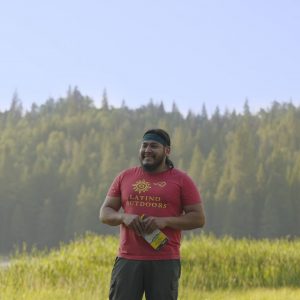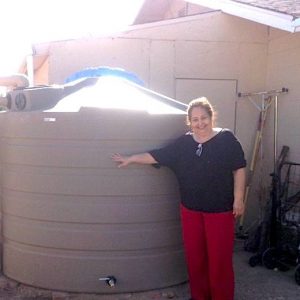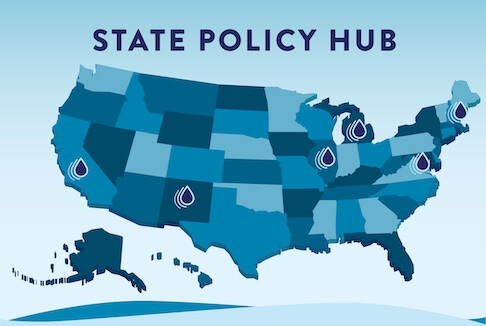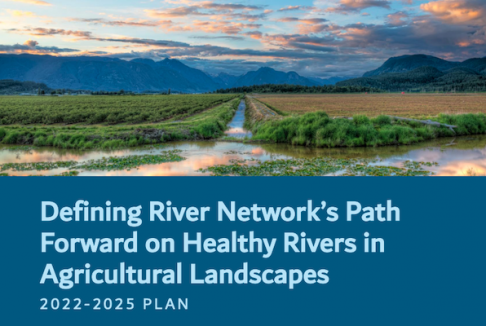River Voices: December 2021

Welcome to the December 2021 edition of River Voices. This month, we’re highlighting groups’ efforts to towards equity, diversity, and inclusion (EDI), through external programs on Wild & Scenic Rivers and through internal efforts advancing EDI within organizations. Plus, explore our new report with WaterNow Alliance on building partnerships with your local water utility!
Over the last year and a half, members of the Wild & Scenic Rivers Coalition have expressed a desire to share lessons learned and highlight successful programs from local groups that are intentionally creating welcoming spaces and engaging Black, Indigenous, and People of Color to enjoy and protect Wild & Scenic Rivers across the country. In October, the Coalition, of which River Network is a founding member, kicked off a series of webinar short – in this first webinar, we heard about CU Maurice River‘s Elevate program and its 16 years of impact.
This month, meet André Sanchez, San Joaquin Valley Organizer at California Wilderness Coalition (CalWild) and learn about his work towards “getting the diverse local community to really engage in public lands advocacy and help change who is at the table when talking about protecting natural resources and landscapes.”
In Tucson, AZ, water is scarce and temperatures can be scorching. Tucson was one of nine communities that joined us and WaterNow Alliance to understand how successful and trusting water utility-community organization partnerships are formed and maintained. Explore their story and our foundations for trust in the new report.
We’re thrilled to welcome Maya Sterett as River Network’s new Community Engagement Assistant, joining Karla Noboa and based in Alexandria, Virginia. Her on-the-ground experience in water quality, pollution, food waste, and ocean wildlife issues continues to further her passion for the environment and finding solutions to these global problems.
The Role of Coalitions in Propelling Diversity, Equity, Inclusion, and Justice Work Forward
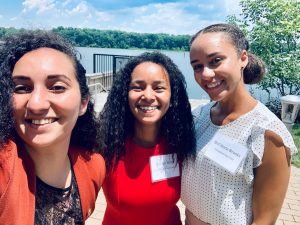 Coalitions, collaboratives, and networks play an integral role in promoting new ideas, building connections, and exploring new avenues for support. As the only national nonprofit whose sole purpose is to connect and strengthen the nationwide network of local water protectors, River Network has used our role to educate ourselves and groups across the network on topics such as equity, diversity, and inclusion (EDI). We are not alone in this work; our partners Choose Clean Water (CCW) and the Coalition for the Delaware River Watershed (CDRW) have created resources, priorities, and welcoming, safe environments in which to discuss these topics.
Coalitions, collaboratives, and networks play an integral role in promoting new ideas, building connections, and exploring new avenues for support. As the only national nonprofit whose sole purpose is to connect and strengthen the nationwide network of local water protectors, River Network has used our role to educate ourselves and groups across the network on topics such as equity, diversity, and inclusion (EDI). We are not alone in this work; our partners Choose Clean Water (CCW) and the Coalition for the Delaware River Watershed (CDRW) have created resources, priorities, and welcoming, safe environments in which to discuss these topics.
With a lot of attention on federal policy related to drinking water right now, be sure to check out our NEW State Policy Hub, which highlights the unique (and similar) policies that states have rolled out, from green amendments in the 1970s to lead service line replacement plans in 2021. The Hub features over 60 individual state-level policies on drinking water topics like PFAS and lead, in addition to “Lessons from the Network,” in-depth features on network leaders who have helped many of these innovative policies come to life.
The nexus between agriculture and water is a critical one and supporting members of our network that work directly with agricultural partners is a relatively new strategic priority for River Network. This new plan builds on our agricultural work in the Colorado River Basin and is informed by a nationwide survey, focus group, and interviews in 2020-2021, with the goal that by 2030, a larger percentage of our network will work alongside their agricultural community to improve the health of rivers and watersheds within agricultural landscapes throughout the US.
Science Corner: EPA Sanitary Survey App for Marine and Fresh Waters
The latest from our science team.
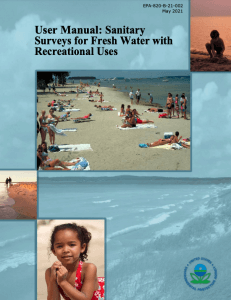
EPA has released a new tool for collecting data on fecal pollution sources affecting surface waters. The EPA’s Sanitary Survey App for Marine and Fresh Waters consists of surveys for both marine and fresh waters that is accessible using the ArcGIS Survey123 app. The surveys are available for use by non-governmental organizations and community/citizen science groups who want to collect and share data on potential sources of fecal pollution and information on potential harmful algal bloom (HAB) events in local surface waters, including designated recreational waters. Some features of the app include photo storage, real time geolocation, links to websites such as the National Weather Service to access data, and free data storage. The app can be used on any device (i.e., phone, tablet, computer) in the field without the need for WiFi or Internet access and is available free, though users must request access credentials (username, password) from EPA to be able to download the surveys in the ArcGIS Survey123 app, using this form. Access credentials are usually granted within 48 hours.
EPA recognizes the collective strength of volunteers in a community being able to collect water quality data. Community/Citizen scientists can provide data on sources of fecal pollution in a watershed and information on potential harmful algal blooms in surface waters. Public health officials need these types of data to make decisions to protect a community. These efforts can also ultimately promote safe public access to urban waterways and lead to aquatic ecosystem restoration.
Inclusive River Recreation Outreach Strategies with the Wild & Scenic Rivers Coalition
Dec. 3, 1:30p ET / 10:30a PT
Join the Wild & Scenic Rivers Coalition for the second webinar short in their series exploring case studies that showcase how local groups are intentionally creating welcoming spaces and engaging Black, Indigenous, and People of Color to enjoy and protect Wild & Scenic Rivers across the country. This month, hear from Lily Durkee, co-founder of Diversify Whitewater.
State Policy Showcase: Using Federal Covid Relief Funds to Pay for Equitable Water Infrastructure
Dec. 6 2p ET / 11a PT
In River Network’s next State Policy Showcase we will be joined by Rebecca Haynes, Deputy Director at Conservation Voters of South Carolina, and Anna Killius, Government Affairs and Policy Manager at James River Association, to share South Carolina and Virginia’s plans to use American Rescue Plan funds for equitable water infrastructure.
Policy Opportunities at the Intersection of Community Development and Urban Waters – A Peer Exchange
Dec. 9, 1p ET / 10a PT
Have you been wondering how can you be more intersectional in your water work? Join the upcoming session to hear from Local Initiatives Support Corporation (LISC) policy professionals about the network of 38 urban offices and policies pertaining to affordable housing, workforce development, and equitable community development.
The National Trust for Historic Preservation’s Telling the Full History Preservation Fund
This one-time grant program will provide financial support to eligible organizations to preserve and interpret historic places across the nation that illuminate narratives of underrepresented groups of people, including but not limited to, women, immigrants, Asian Americans, Black Americans, Latinx Americans, Native Americans, Native Hawaiians, Pacific Islanders, and LGBTQ communities.
We’re Hiring! VP of Finance, Operations, and People
River Network seeks a Vice President of Finance, Operations, and People to serve as a vital member of our Leadership Team and lead the team responsible for financial strategy, budgeting, human resources, and IT support. We are looking for a mission-driven team player with an entrepreneurial spirit who is excited about helping achieve a future where everyone has access to affordable, clean water and healthy rivers.
Five Star and Urban Waters Restoration Grant Program 2022
The National Fish and Wildlife Foundation and partners are pleased to solicit applications for the Five Star and Urban Waters Restoration Program. This program will award grants for programs to develop community capacity to sustain local natural resources for future generations by providing modest financial assistance to diverse local partnerships focused on improving water quality, watersheds and the species and habitats they support.
- “4 Easy Ways to Build a More Accessible Outdoors”
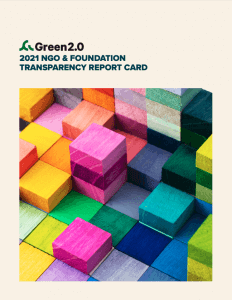 – Adam Edwards writes for Melanin Base Camp on reducing barriers to entry in the Northwest’s paddling community. (h/t to Corita Waters for sharing this story in River Network’s Online Community)
– Adam Edwards writes for Melanin Base Camp on reducing barriers to entry in the Northwest’s paddling community. (h/t to Corita Waters for sharing this story in River Network’s Online Community) - Green 2.0 2021 – The newest version of the Green 2.0 NGO Transparency Report Card was released in mid-November. The fifth year of the report, it now includes information about foundation investments as well.
- A River’s Right to Flow – Indigenous communities and conservationists around the world are challenging the view of water as a human commodity, and fighting to keep this precious resource in the ecosystems it sustains. (h/t to Ashley Mocorro Powell for sharing this story in River Network’s Online Community)


